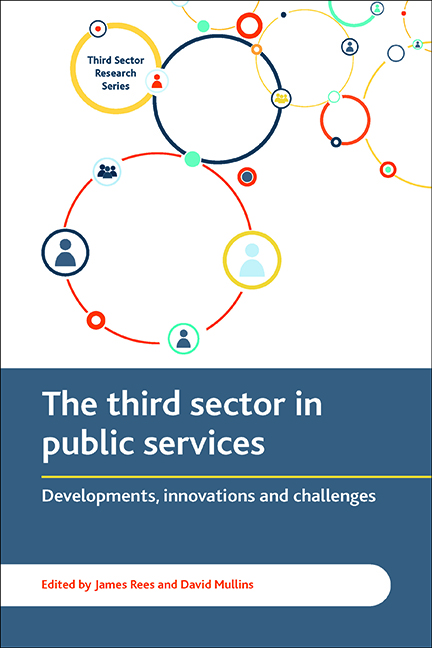Book contents
- Frontmatter
- Contents
- List of tables, figures and boxes
- Series editor’s foreword
- Notes on contributors
- one The third sector delivering public services: setting out the terrain
- Part One Policy, politics and organisations
- Part Two Cross-cutting issue for third sector service delivery
- Part Three Service delivery in key policy fields
- Index
Series editor’s foreword
Published online by Cambridge University Press: 05 April 2022
- Frontmatter
- Contents
- List of tables, figures and boxes
- Series editor’s foreword
- Notes on contributors
- one The third sector delivering public services: setting out the terrain
- Part One Policy, politics and organisations
- Part Two Cross-cutting issue for third sector service delivery
- Part Three Service delivery in key policy fields
- Index
Summary
For over three decades in the UK, governments have sought to restrain or roll back the frontiers of the state, and to expand the scope for third sector involvement in the provision of welfare services. Incorporating a broad range of voluntary organisations, legal forms and individual actions, the third sector now occupies a central place in political debate and social policy discussions. Even if the fiscal constraints of the present era were not in place, frustrations with the limits of top-down state intervention on one hand and the social costs of free markets on the other would have forced a critical appraisal of what can be achieved through voluntary initiative.
Yet the contours of recent changes in the third sector remain relatively under-explored in the UK. Even delimiting the ‘loose and baggy monster’, as the sector has been characterised, poses considerable conceptual and measurement challenges: these days the monster is a hybrid, if not a Hydra. Assessing its potentially distinctive contribution is equally problematic: the sector symbolises many different things to different people – a space of uncoerced private action for public good, a school of democracy and participation, a source of social innovation, and a cost-effective and flexible alternative to statutory service provision. Finally, whether the third sector can – and should – be enlisted in the service of public policy is also a contested matter, as are the terms under which it may be so enlisted. And does it have a distinctive impact and added value in its own right, or is that the terrain of claims made by disingenuous politicians or by the sector's self-interested publicists?
Major developments in these issues in the last decade or so provide the rationale for a series which will present new research findings and which addresses key academic and policy debates in relation to the third sector. It is a truism widely acknowledged that there are great expectations of this sector. But continuing on the Dickensian theme, the hard times which face the welfare state necessitate not the small-scale, esoteric regional descriptions and heroic anecdotes which characterise much literature in this field. They call for large-scale and systematic work which addresses significant questions. That was the rationale for the Third Sector Research Centre, from whose first five-year programme of work this volume represents the first book-length output.
- Type
- Chapter
- Information
- The Third Sector Delivering Public ServicesDevelopments, Innovations and Challenges, pp. vi - viiPublisher: Bristol University PressPrint publication year: 2016

